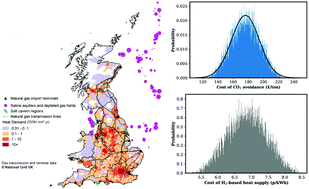What is needed to deliver carbon-neutral heat using hydrogen and CCS?†
Abstract
In comparison with the power sector, large scale decarbonisation of heat has received relatively little attention at the infrastructural scale despite its importance in the global CO2 emissions landscape. In this study we focus on the regional transition of a heating sector from natural gas-based infrastructure to H2 using mathematical optimisation. A discrete spatio-temporal description of the geographical region of Great Britain was used in addition to a detailed description of all network elements for illustrating the key factors in the design of nation-wide H2 and CO2 infrastructure. We have found that the synergistic deployment of H2 production technologies such as autothermal reforming of methane, and biomass gasification with CO2 abatement technologies such as carbon capture and storage (CCS) are critical in achieving cost-effective decarbonisation. We show that both large scale underground H2 storage and water electrolysis provide resilience and flexibility to the heating system, competing on cost and deployment rates. The optimal regions for siting H2 production infrastructure are characterised by proximity to: (1) underground H2 storage, (2) high demands for H2, (3) geological storage for CO2. Furthermore, cost-effective transitions based on a methane reforming pathway may necessitate regional expansions in the supply of natural gas with profound implications for security of supply in nations that are already highly reliant, potentially creating an infrastructure lock-in during the near term. We found that the total system cost, comprising both investment and operational elements, is mostly influenced by the natural gas price, followed by biomass price and CapEx of underground caverns. Under a hybrid Regulated Asset Base (RAB) commercial framework, with private enterprises delivering production infrastructure, the total cost of heat supply over the infrastructure lifetime is estimated as 5.2–8.6 pence per kW h. Due to the higher cost relative to natural gas, a Contract for Difference payment between £20 per MW h and £53 per MW h will be necessary for H2-derived heat to be competitive in the market.



 Please wait while we load your content...
Please wait while we load your content...